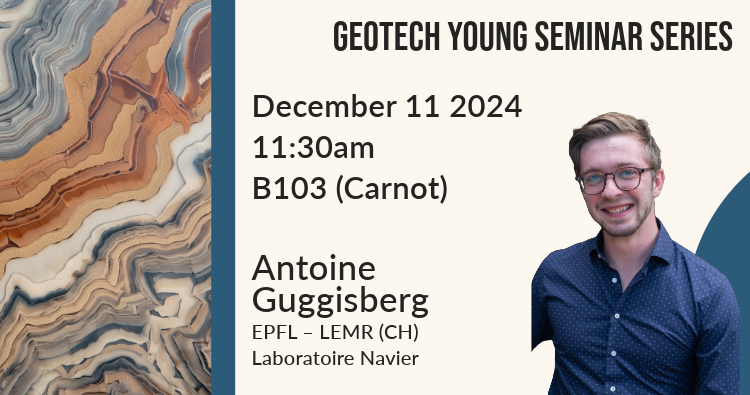
Geotech Young Seminar Series: Antoine Guggisberg (EPFL – Navier)
Tensile crack propagation in rocks: from microstructure to toughening mechanisms
Abstract:
Crustal mechanics are governed by the presence of cracks in rocks. The onset of their propagation is often described by a unique material property, the fracture energy. However, in geomaterials, this parameter varies with environmental and loading conditions (e.g., temperature, confining pressure, water content, loading rate, etc.). These variations stem from shifts in the failure mechanisms governing material breakdown at the crack tip. Here, we demonstrate how biaxial stresses and water saturation in rock pores impact the apparent fracture energy through changes in the underlying propagation mechanisms.
First, controlled tensile crack propagation experiments under opposite stress biaxialities reveal that fracture energy variations correlate with intricate crack microstructures observed post-mortem. Microscopy techniques show that biaxial tension induces microstructural features such as deflections and branches, which circumnavigate tougher grains. This yields a higher fracture energy, that we attribute to front roughening and bridging mechanisms due to front fragmentation. The bridging, gradually increasing with crack size, hint at the existence of a scale dependency in dikes subjected to biaxial tension.
Second, we bring proof to the poromechanical coupling between fluid flow and matrix deformation during rapid crack propagation in saturated rocks. Controlled propagation tests within a triaxial cell on a cement-based rock analogue provide direct evidence of pore pressure fluctuations, validating theoretical predictions. Crack speed is shown to dictate pore pressure variations, creating an underpressurized zone near the crack tip. Faster propagation amplifies this effect, inducing toughening mechanisms, including undrained toughening and altered micromechanical breakdown processes.
These findings underscore the complexity of tensile cracks in geomaterials, driven by their porous and heterogeneous nature, and shed light on the mechanisms controlling their propagation.
Short bio:
Antoine Guggisberg is a Ph.D. student in the Laboratory of Experimental Rock Mechanics (LEMR) at École Polytechnique Fédérale de Lausanne (EPFL). He holds a Bachelor’s and Master’s degree in Civil Engineering from EPFL, with a specialization in geotechnics and underground construction. Under the supervision of Prof. Marie Violay and Prof. Mathias Lebihain, his research focuses on experimentally studying tensile crack propagation in geomaterials. In particular, this work aims to understand the mechanisms governing crack propagation and their effects on rock resistance in geological applications.


